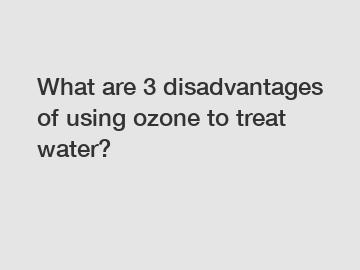Jan. 14, 2024
Machinery
The use of ozone as a water treatment method has gained popularity due to its effectiveness in eliminating contaminants and disinfecting water. Ozone is a powerful oxidant that can remove various pollutants and microorganisms present in water. However, like any other water treatment technique, ozone also has certain disadvantages that need to be considered. In this article, we will discuss three disadvantages of using ozone to treat water and explore the implications of these drawbacks.
1. High Operational Cost:
One significant disadvantage of using ozone for water treatment is the high operational cost associated with its implementation. Ozone generation requires expensive equipment and advanced technology, which can be a significant financial burden for smaller treatment facilities. Additionally, the energy consumption of ozone generators is relatively high compared to other treatment methods. Ozone production requires energy-intensive processes, such as the use of corona discharge or ultraviolet radiation, which can significantly increase the cost of water treatment. Moreover, frequent maintenance and replacement of parts in ozone systems further add to the operational expenses, making it less economically viable for certain applications.

2. Short Residual Effectiveness:
Another drawback of ozone water treatment is its short residual effectiveness. Unlike chlorine, which can provide a lasting disinfection effect, ozone has a limited residual life in water. Once ozone is generated and injected into the water, it rapidly decomposes, leaving no residual effect. Consequently, there is a greater risk of microbial re-growth in the distribution system after ozone treatment, especially if the treated water is stored for an extended period or transported over long distances. This limitation necessitates additional steps, such as chlorine disinfection or UV radiation, to maintain a residual disinfectant in the treated water.
3. Limited Efficiency on Certain Contaminants:
While ozone is highly effective at disinfection and the removal of many organic and inorganic contaminants, it may not be as efficient in eliminating certain substances. For example, ozone is not effective in removing dissolved metals, such as iron or manganese, from water. Moreover, some emerging contaminants, such as pharmaceuticals and personal care products, may require advanced oxidation processes or activated carbon filtration in combination with ozone for effective removal. Therefore, a comprehensive water treatment strategy should consider the limitations of ozone in efficiently treating all types of contaminants to ensure a safe and clean water supply.
In conclusion, despite its numerous advantages, ozone water treatment has several disadvantages that should be taken into account. The high operational cost, limited residual effectiveness, and limited efficiency on certain contaminants are important factors to consider when deciding on a water treatment approach. While ozone can be an excellent treatment option for specific applications, it may not be suitable for all scenarios. Therefore, a thorough evaluation and understanding of the water quality and specific treatment needs are crucial before implementing an ozone system.
If you are considering ozone water treatment for your facility or have any further questions about its advantages and disadvantages, please feel free to contact us. Our professional team will be more than happy to assist you in selecting the most suitable water treatment solution for your specific requirements.
For more 100g ozone generator, Ozone Generator For Shrimp Farm, 150g ozone generatorinformation, please contact us. We will provide professional answers.
If you are interested in sending in a Guest Blogger Submission,welcome to write for us!
All Comments ( 0 )